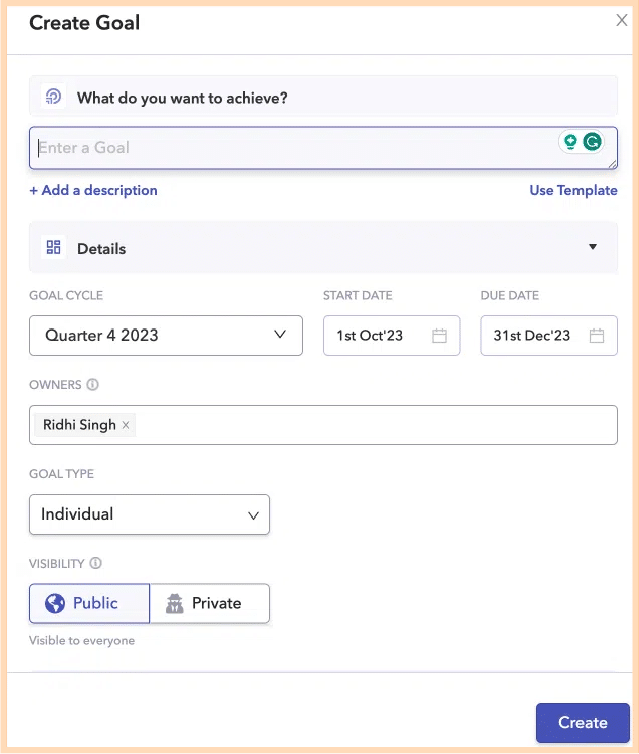In the workplace, we often hear terms like “performance management” and “performance appraisal” thrown around. But what do they really mean, and how are they different? Let’s take a closer look at performance management vs performance appraisal, and understand their significance in fostering a productive work environment.

What is Performance Management?
Performance management is a systematic process aimed at improving individual and team performance within an organization. It involves setting clear objectives, providing regular feedback, identifying areas for development, and recognizing achievements.
Imagine you are a manager. Riya is a talented member of your team, and you want to ensure she excels in her role while contributing to the success of the entire department. This is where performance management steps in.
Goal Setting: At the beginning of the year, you sit down with Riya to discuss her goals. Together, you identify key objectives, such as increasing client satisfaction, meeting project deadlines, and enhancing her leadership skills. These goals serve as benchmarks for her performance throughout the year.
With performance management systems like Peoplebox.ai, employees like Riya can set goals themselves effortlessly.

Continuous Feedback Process: Throughout the year, you maintain an open line of communication with Riya, providing feedback on her performance on an ongoing basis. This feedback isn’t limited to formal meetings; it’s integrated into daily interactions and project discussions. It’s about acknowledging her successes, addressing any concerns, and guiding her towards performance improvement.
Development and Coaching: Recognizing Riya’s potential for growth, you provide her with opportunities for professional development and coaching. This could involve enrolling her in training programs, arranging mentorship sessions, or assigning her stretch assignments to expand her skill set.
Performance Reviews: Performance reviews are conducted at different intervals to assess Riya’s progress and performance comprehensively:
- Weekly and Monthly Check-ins: These are brief meetings held every month to touch base on Riya’s progress towards her goals, address any immediate concerns, and provide timely feedback.
- Quarterly Reviews: Quarterly reviews look deeper into Riya’s performance over a three-month period. They allow for a more thorough evaluation of her progress, strengths, and areas of improvement.
- Annual Review: The annual review is a culmination of Riya’s performance over the entire year. It involves a comprehensive review of her achievements, feedback from peers, the manager, and direct reports through 360-degree reviews, and discussions about her career trajectory within the organization.
Through this multifaceted approach to performance management, Riya receives consistent support, guidance, and recognition. Now, let’s see what a performance appraisal is.
What is Performance Appraisal?
A performance appraisal is a specific event focused on evaluating an employee’s past performance against established goals and standards. It’s a structured assessment that typically occurs at regular intervals (e.g., annually) and serves two key purposes:
Measure and Evaluate Past Performance: It involves analyzing data like goal achievements, feedback received, and self-assessments to create a comprehensive evaluation of an employee’s contributions. Imagine evaluating a customer service representative based on their adherence to company policies, customer satisfaction ratings, and adherence to established metrics like call resolution times.
Inform Compensation and Promotion Decisions: Based on the performance appraisal, organizations can make informed choices regarding salary adjustments, promotions, or other personnel actions. This ensures that rewards and career advancement are aligned with demonstrated performance and contributions.
Let’s say Riya consistently exceeded customer satisfaction goals, resolved customer issues efficiently, and consistently adhered to company policies. In this scenario, the performance appraisal becomes a tool to justify a well-deserved salary adjustment or promotion for Riya, recognizing and rewarding her exemplary performance.
Differences Between Performance Management And Performance Appraisal
While often used interchangeably, performance management and performance appraisal are distinct yet intertwined concepts contributing to a thriving workforce. Understanding their differences is crucial for creating a balanced and effective system for employee development and success.
| Aspect | Performance Management | Performance Appraisal |
| Focus | Future-oriented, emphasizing continuous improvement | Past-oriented, focused on evaluating past performance |
| Timeline | Ongoing and continuous | Periodic and typically conducted annually or semi-annually |
| Nature of Feedback | Regular and constructive | Summative and often formalized |
| Purpose | Enhance employee development and alignment | Assess past performance and inform decisions |
| Scope | Holistic, covering various aspects of performance | Specific, often limited to a set of predefined criteria |
| Employee Involvement | Collaborative, involving ongoing discussions | Feedback may be less frequent and one-sided |
| Feedback Sources | Multifaceted, including peer reviews, manager reviews, and self-assessment | Mainly from supervisors or managers |
| Goal Setting | Ongoing process with dynamic goal adjustments | Initial goal setting at the beginning of the performance period |
| Decision-Making | Emphasizes continuous improvement and development | Often influences decisions on promotions, raises, and career paths |
| Communication | Open and regular communication channels | Formalized communication during the appraisal period |
Want to learn more? Just scroll down to see a detailed explanation of each point and understand them more clearly.
Performance Management vs Performance Appraisal — Focus:
- Performance management: The performance management process is a future-oriented process focused on continuous improvement and employee development. It promotes setting clear goals, providing regular performance feedback, and fostering a culture of learning and growth.
- Performance appraisal: This is a past-oriented process focused on evaluating an employee’s performance against pre-defined criteria during a specific period. It serves as a snapshot of past performance and informs decisions like promotions, compensation, and training needs.
Performance Management vs Performance Appraisal — Timeline:
- Performance management: This is an ongoing and continuous process that happens throughout the year. It involves regular check-ins, adjustments, and feedback loops to ensure employees are on track and supported in their development.
- Performance appraisal: This is a periodic process, typically conducted annually or semi-annually. It involves a formal evaluation and documentation of an employee’s performance during the specific review period.
Performance Management vs Performance Appraisal — Nature of Feedback:
- Performance management: This process emphasizes regular and constructive feedback. It encourages open communication and two-way dialogue between managers and employees to identify areas for improvement and provide ongoing support.
- Performance appraisal: This process entails summative and often formalized feedback. It summarizes the employee’s performance over the reviewed period and often takes the form of a written report or discussion with limited opportunity for ongoing dialogue.
Performance Management vs Performance Appraisal — Purpose:
- Performance management: The primary objective of performance management is to enhance employee development and ensure their alignment with organizational goals. It aims to create a supportive environment where employees can learn, grow, and reach their full potential.
- Performance appraisal: The primary purpose is to assess past performance and inform decisions regarding promotions, compensation adjustments, training needs, and potential disciplinary actions.
Performance Management vs Performance Appraisal — Scope:
- Performance management: This takes a holistic approach, encompassing a broad range of factors beyond just job tasks. It considers skills, behaviors, contributions to the team, and alignment with organizational values.
- Performance appraisal: This takes a specific approach, often limited to a set of predefined criteria and job-related tasks. It focuses on assessing the employee’s performance against these predetermined standards.
Performance Management vs Performance Appraisal — Employee Involvement:
- Performance management: This is a collaborative process that involves ongoing discussions between managers and employees. It encourages employee participation in goal setting, self-assessment, and feedback exchange.
- Performance appraisal: This may involve less frequent and potentially one-sided feedback from supervisors or managers. The employee’s involvement may be limited to providing self-assessment or responding to feedback received during the review period.
Performance Management vs Performance Appraisal — Feedback Sources:
Performance management: This incorporates multifaceted feedback sources. It may include input from peers, supervisors, and self-assessment, providing a comprehensive perspective on an employee’s performance.

- Performance appraisal: The feedback typically comes mainly from supervisors or managers. While self-assessment may be included, it may hold less weight in the overall evaluation.
Performance Management vs Performance Appraisal — Goal Setting:
- Performance management: This involves an ongoing process with dynamic goal adjustments. It fosters an environment where goals are updated and refined throughout the year to reflect changing priorities and individual development needs.
- Performance appraisal: This typically involves initial goal setting at the beginning of the performance period. The goals may be reviewed periodically, but the process is generally less flexible and dynamic than performance management.
Performance Management vs Performance Appraisal — Decision-Making:
- Performance management: This emphasizes continuous improvement and development. While performance data informs decisions, it is primarily used to identify areas for growth and provide ongoing support.
- Performance appraisal: This often influences decisions on promotions, raises, and career paths. The performance evaluation results directly impact career progression and rewards, making it a more high-stakes process.
Performance Management vs Performance Appraisal — Communication:
- Performance management: This requires open and regular communication channels. Ongoing discussions, feedback conversations, and goal-setting meetings are crucial throughout the year.

- Performance appraisal: Communication tends to be more formalized during the appraisal period. The focus is on delivering the evaluation results and discussing potential consequences (positive or negative) based on the assessed performance.
Though we have established the differences between performance management and performance appraisal, we must note that they are intertwined and work best when used in tandem to create a comprehensive performance appraisal system for employee development.
Why Performance Management and Performance Appraisal Matter
Continuous Improvement
Performance management cultivates a culture of continuous improvement through regular feedback and dialogue between managers and employees throughout the year. Complementing this, performance appraisal provides a formalized assessment of past performance, pinpointing successes and areas for development to guide future growth.
Goal Alignment
Performance management aligns individual goals with organizational objectives, fostering employee engagement and motivation. On the other hand, performance appraisal evaluates goal achievement, providing valuable insights into the effectiveness of goal-setting processes and facilitating the realignment of individual and organizational priorities as needed.

Feedback Loop
Performance management establishes a feedback loop where employees receive ongoing guidance and support to enhance their skills and performance. Performance appraisal serves as a checkpoint within this loop, offering a more structured review of performance and reinforcing the importance of continuous feedback in driving employee development.
Informed Decision-Making
Performance management equips managers with real-time data and insights into employee performance, enabling informed decisions on development plans and resource allocation.
For example, Peoplebox.ai lets you see all employee performance data and key performance indicators in real-time, helping you make strategic people decisions.

Performance appraisal contributes to this by providing a comprehensive overview of an employee’s contributions and informing decisions on compensation adjustments, promotions, and career paths based on demonstrated performance.
Employee Engagement and Recognition
Performance management enhances employee engagement by recognizing achievements and providing development programs within a supportive work environment. Performance appraisal reinforces this by formally recognizing and rewarding employees for their contributions, reinforcing positive behaviors, and motivating sustained performance excellence.
Peoplebox.ai: Empowering Effective Performance Management & Appraisal
Peoplebox.ai is your all-in-one solution for streamlined performance management strategy and appraisal processes. With a unified platform, it simplifies goal setting, facilitates real-time feedback, and introduces 360-degree reviews for a holistic performance view.

Whether it’s weekly check-ins or annual appraisals, Peoplebox.ai offers flexible review cycles, ensuring continuous monitoring. Leverage data-driven decision-making with insightful analytics and boost employee engagement through regular recognition. The user-friendly interface makes navigation effortless, and you can experience the transformative power of Peoplebox.ai by requesting a demo today.








